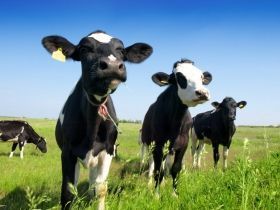Some calves are inherently optimistic or pessimistic, just as humans are, a new University of British Columbia study has found.
Recognizing these individual personality differences is important to ensure animals are treated well, says professor Marina von Keyserlingk, who led the research team from UBC’s animal welfare program in the faculty of land and food systems.
Some calves are inherently optimistic or pessimistic, just as humans are, a new University of British Columbia study has found.
Recognizing these individual personality differences is important to ensure animals are treated well, says professor Marina von Keyserlingk, who led the research team from UBC’s animal welfare program in the faculty of land and food systems.
“Sometimes we are tempted to see only the herd, even though this herd consists of different individuals who cope differently with stressful events,” said von Keyserlingk. “It’s important to consider the individual’s perspective, because even if conditions are good, on average, some animals may still suffer.”
To gauge optimism and pessimism, the researchers set up an experiment involving 22 calves. Before they started the experiment, they trained the calves to understand which of their choices would lead to a reward. In the training, each calf entered a small pen and found a wall with five holes arranged in a horizontal line, two-and-a-half feet apart. The hole at one end contained milk from a bottle, while the hole at the opposite end contained only an empty bottle and delivered a puff of air in calves’ faces. The calves learned quickly which side of the pen held the milk reward.
Continue reading at University of British Columbia.
Image via University of British Columbia.




